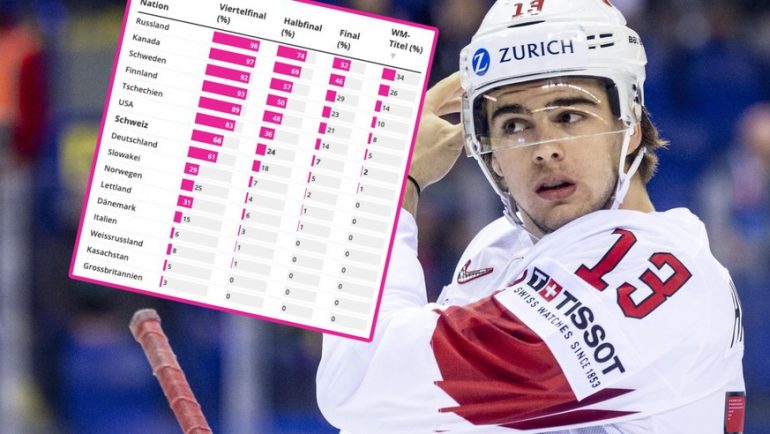Switzerland has title chances in Riga – even if it is short. Picture: Keystone
Analysis
Who has the best chance of winning the World Hockey Championship? It knows simulation
Who will be the ice hockey world champion in Riga in 2021? Watson has joined hands with Swiss data experts to answer this question.
How do you predict which team or player will succeed in a sporting event? On the one hand, there is a sense of good old gut – not always reliable, but sometimes good for a stroke of luck. There are statistics that can be interpreted. But simulation is the most reliable way to detect possibilities.
This is why Watson teamed up with experts at DataHouse, the Swiss team of data science experts prior to the Ice Hockey World Championships. The spin-off of ETH Zurich has created a simulation to predict the most likely world champions of the upcoming tournament in Riga.
The simulation works like this:
- The first step is to define the strengths of each team. The current betting odds of the three largest betting offices, along with position and points in the IIHF world rankings, are used to take into account the strength of the teams. Both factors are weighted equally.
- In each game, the respective strengths of the two teams are compared and an outcome is simulated – the greater the difference, the greater the probability of a goal at each stage of the game and thus the stronger team wins.
- After this, the entire World Cup will be played 10,000 times. The “probability” of a scenario (as Switzerland becomes the world champion) is then the percentage of 10,000 runs in which the scenario took place.
These results are:
Datahouse’s simulation predicts Russia as the most probable world champion. «Sabornja» won the title in 34 percent of the 10,000 runs. The second most likely world champion is Canada, which has a 26 percent chance of winning gold.
After all, Switzerland is said to have a 2 percent chance of winning gold – in 10,000 simulations, the national team became the world champion 200 times. The model basically retains the possibility of winning a medal: Switzerland made it to the semi-finals with 24 percent of the runs.
And how exactly do these predictions apply? «Simulation indicates probabilities based on thousands of realizations. In individual cases, however, a very unlikely event can occur, ”says Severin Trösch from the datahouse.
The datahouse team model can be applied not only to the entire outcome of the tournament, but also to the individual games of the Swiss national team.
Unexpectedly, the model defines Russia as the strongest Swiss group rival. Switzerland wins against “Sornaja” in only 23 percent of cases, with the result of a 1: 4 defeat being the most frequent in the simulation.
But the national team is the clear favorite against younger opponents in the group. Patrick Fisher’s squad won 8,500 times out of 10,000 simulations against Great Britain.
Thank You for
Would you like to support Watson and journalism? learn more
(You will be redirected to complete payment)
Nico Hissier – An NHL Military Star
Are you a real ice hockey fan? In this way you make that stadium feel at home.
You might also be interested in:
Subscribe to our newsletter

Web guru. Amateur thinker. Unapologetic problem solver. Zombie expert. Hipster-friendly travel geek. Social mediaholic.





